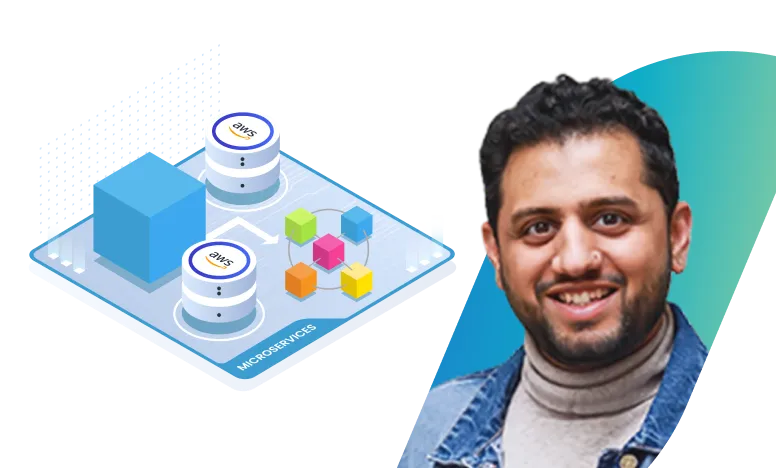.svg)
What you’ll learn
Our students work at..







Description
Welcome to the comprehensive course on building scalable microservices using Amazon Web Services (AWS). In this course, you will learn everything you need to know to design, develop, deploy, and manage microservices architecture on AWS. You will create microservices with our end-to-end hands-on labs.
Here are some of the key topics covered in this course:
- Introduction to Microservices:
- Understand the principles and benefits of microservices architecture.
- Learn how microservices differ from monolithic architectures.
- Explore real-world use cases and examples of successful microservices implementations.
- Setting up Cloud9 and Docker:
- Set up an AWS Cloud9 development environment for efficient coding and collaboration.
- Learn Docker fundamentals and how to containerize your microservices for easy deployment and scalability.
- CodeBuild and ECR:
- Utilize AWS CodeBuild to automate build processes and ensure code quality.
- Learn how to securely store and manage Docker images with Amazon Elastic Container Registry (ECR).
- Deploying Services onto ECS:
- Deploy your microservices onto Amazon Elastic Container Service (ECS) for high availability and scalability.
- Configure ECS clusters, services, and tasks to efficiently run your containers.
- Task Definition, Image Tags in Production, and Load Balancer:
- Define tasks and specify container configurations using ECS Task Definitions.
- Implement best practices for managing image tags in production environments.
- Set up and configure AWS Elastic Load Balancer (ELB) to distribute traffic to your microservices.
- Rolling Deployment and Rollback of Deployments:
- Implement rolling deployments to update your microservices with zero downtime.
- Learn rollback strategies to revert to previous versions in case of issues or failures.
- CodePipeline Automated Deployment:
- Automate your deployment process using AWS CodePipeline.
- Create CI/CD pipelines to build, test, and deploy your microservices with ease.
- Monolith to Microservice Design:
- Understand the challenges and benefits of transitioning from a monolithic architecture to microservices.
- Learn strategies and best practices for refactoring and decomposing monolithic applications into microservices.
Throughout this course, you will work on hands-on labs and real-world projects to reinforce your understanding of each topic. By the end of this course, you will have the skills and knowledge to architect, build, and deploy scalable microservices applications on AWS effectively.
What our students say

About the instructor
Raghunandana Krishnamurthy is a seasoned Staff Data Engineer and MLOps expert, skilled in navigating both GCP and AWS cloud platforms to accelerate model development and deployment. His experience spans modernizing legacy data systems, architecting hybrid infrastructures, and ensuring data quality for diverse applications. He used to hold Associate AWS Solution Architect certification, Cloudera Hadoop Admin certification, Airflow certification, and Databricks Lakehouse certification
A technical leader and passionate trainer, Raghunandana excels at building and maintaining big data platforms, championing DevOps best practices, and fostering team alignment. With hands-on expertise in tools like SageMaker, VertexAI, Prometheus, Grafana, and extensive DevOps tools focusing on Data Engineering and MLOps.
Introduction

Introduction to Microservices

Overview of the project

Settingup cloud9 and docker

CodeBuild and ECR

Deploying Service on to ECS

Task definition, Image tags in production and Load Balancer

Rolling deployment and Rollback of deployments

CodePipeline automated deployment

Monolith to Microservice design

.svg)


.svg)
.svg)

.webp)




